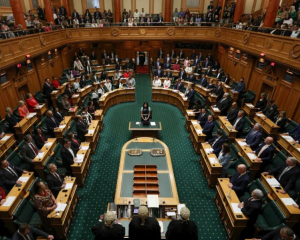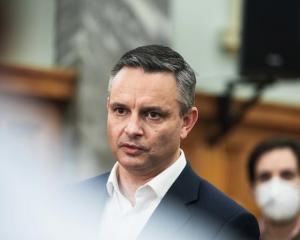Billionaire Owen Glenn could be asked to give evidence to Parliament's privileges committee as it examines his $100,000 payment towards Winston Peters' legal bill and whether it should have been declared by the MP.
But the committee will have to get cracking if the matter is to be dealt with before Parliament ends in preparation for the election.
That is expected to be in five to seven weeks.
Parliament's Speaker Margaret Wilson yesterday ordered the privileges committee to look into the matter after complaints by two MPs that Mr Peters, the Foreign Minister and leader of New Zealand First, should have declared the $100,000 payment in the register of MPs' financial interests.
Act leader Rodney Hide was one of the complainants and will step down from the committee while the complaint is heard.
Mr Hide has been leading the attack against Mr Peters over two secret donations issues.
The first is about Mr Peters having his legal fees paid, and the second is over his refusal to answer questions from Sir Robert Jones about whether a $25,000 donation he sent to the New Zealand First party in 2005 through the secret Spencer Trust reached its destination.
Mr Hide said last night he expected that the committee would ask Mr Glenn to take part.
The expatriate New Zealander lives in Monaco.
"It would be odd if they didn't seek to hear from Owen Glenn, and video link-ups are easy to do."
He also suggested that the privileges committee could look at matters other than the Glenn donation.
"You'd be surprised if it didn't look into the Spencer Trust as well."
Mr Peters last night said he welcomed the inquiry, which would give the committee the opportunity to see the facts set out in the clear light of day.
"We would like this matter dealt with as soon as possible," Mr Peters said.
Mr Peters acknowledged the Glenn payment almost three weeks ago.
Emails from Mr Glenn to his New Zealand PR man, published by the Herald, showed Mr Glenn believed he had donated money to NZ First.
Mr Peters repeatedly denied that Mr Glenn had given money to the party.
When he admitted that that payment had been made, he said his lawyer, Brian Henry, had told him of it only that day, July 18.
The money had been used to pay the legal bill for the electoral petition Mr Peters took against Tauranga National MP Bob Clarkson.
Margaret Wilson said Mr Peters had given her "a very full and compelling explanation of his position."
But she referred the matter to the privileges committee "because of the high public interest and the implications for the reputation of members and the institution of Parliament".
Mr Glenn could not be contacted last night.
And Mr Peters' barrister, Brian Henry, would not comment except to say: "Nothing about the privilege's committee worries me at all. It could be a bit of fun."
The committee is supposed to operate as an apolitical ethics committee for MPs, although in previous inquires it has become highly politicised - such as in the inquiry it held into an altercation between Mr Peters and then National MP John Banks in 1997.
The committee asked Mr Peters to apologise but he did not do so.
The value of the committee is in its power to compel people to hand over documents and give evidence.
Its members are National MPs Simon Power (chairman), Gerry Brownlee, Wayne Mapp and Nathan Guy, Labour's Michael Cullen, Lianne Dalziel, Paul Swain and Russell Fairbrother, Mr Peters, Metiria Turei (Greens), Hone Harawira (Maori Party), Peter Dunne (United Future) and Rodney Hide (Act).
* Serious Fraud Office director Grant Liddell says he cannot use his statutory powers to assess the complaint about what happened to donations earmarked for NZ First.
Mr Liddell said he could not force documents to be produced until he had a "reason to suspect an investigation may disclose serious and complex fraud".
He said a former SFO investigator who told the Herald the powers could be used was wrong.
Mr Liddell said he had not made any decision in relation on week's complaint by Mr Rodney Hide.
He would make the decision on relevant available documents or other material.
KEY QUESTIONS
* Did Mr Peters know his bill had been paid by someone else?
* If he didn't, should he have known?
* What did Owen Glenn believe his donation was for?
* Was the payment of Peters' bill a gift or the payment of a debt?
* Should it have been declared in the register of MPs' pecuniary interests?
* Do the rules for declaration need to be clarified?
STAR PLAYERS
* Winston Peters, New Zealand First leader
* Owen Glenn, Monaco-based billionaire
* Brian Henry, barrister, Winston Peters' lawyer
* Rodney Hide, complainant
* Simon Power, National MP, chairman of privileges committee











